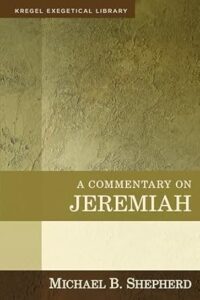Here’s a mind-bending thought about Jeremiah from Michael B. Shepherd: What if the Masoretic Text version of Jeremiah is not in agreement with the canon’s own interpretation of Jeremiah as represented by Ezekiel and Daniel?
Greek, Hebrew and Divine Inspiration
 In his new commentary, where he backtranslates from the Greek Septuagint text of Jeremiah to Hebrew, he struggles with the problem of divine inspiration. He says,
In his new commentary, where he backtranslates from the Greek Septuagint text of Jeremiah to Hebrew, he struggles with the problem of divine inspiration. He says,
“A biblical doctrine of inspiration, not to mention the exigencies of making a translation and commentary, requires a careful text-critical decision about which edition of Jeremiah is God-breathed and superintended by the Spirit” (p. 18).
The version of Jeremiah in our modern Bibles is based on the Hebrew Masoretic Text. It’s the gold standard for the Old Testament in general. However, we have always had an alternate Greek version of Jeremiah that comes in a different order, has certain “pluses” and “minuses” versus the Hebrew text and generally reads differently. The Greek text is about one seventh shorter than the Hebrew text, according to computerized analyses.
Hebraica Veritas
Now normally, you’d be thinking: “Why does this matter? The ancient Israelites spoke Hebrew, not Greek, so the Hebrew text must be better.” Often this is the case and goes with St. Jerome’s dictum, Hebraica veritas. But in this case, things get really dicey. While the Dead Sea Scrolls contained a small handful of fragmentary Jeremiah manuscripts, two fragments are of great interest here: 4QJerb (9:22–10:18) and 4QJerd (43:3–9). These two fragments, dated to about 200 BC, agree with the Septuagint version against the Hebrew Masoretic text!
Two Significant Changes in Jeremiah’s Message
Again, normally you’d think: “Ah, no big deal. It’s probably just minor spelling variations and a few pronouns.” But again, not correct. If these two fragments are definitive, they show that the “proto-Masoretic” Hebrew Vorlage of Septuagint Jeremiah is more ancient than the Hebrew. And remember that the earlier edition of Jeremiah is substantially shorter—one seventh shorter than MT Jeremiah. Beyond that, Shepherd argues, that the “theological message” of the book changes dramatically from the original version to the MT version in two ways:
- He says, “In the first edition, the mysterious enemy from the north (Jer. 1:13–15; LXX 25:1–13; et al.) is never identified with a historical enemy. This leaves open the possibility of an eschatological enemy, which is the way Ezekiel reads the prophecy (Ezek. 38:14–17; cf. LXX Num 24:7; Rev 20:8). In the section edition [MT], the enemy from the north is identified with Babylon (e.g. MT Jer. 25:1–13).” (pp. 16-17)
- The second difference is more subtle—that the first edition of Jeremiah leaves the interpretation of the prophecy of the seventy years (25:11; 29:10) open-ended, so that it could be about a literal historical fulfillment (as Daniel 9:1–19 understands it) or “symbolic of a complete indefinite period (cf. Gen 4:24; Matt. 18:22)” as in Daniel 9:24–27 (p. 17). But the second edition of Jeremiah 25:11, presented in the MT, “limits the prophecy to a historical fulfillment” because it identifies the enemy as Babylon.
What Shepherd is arguing is profound, though the details are subtle. He is saying that the earlier edition of Jeremiah, the proto-Masoretic Hebrew represented by the Septuagint Greek translation, is the “earlier, shorter edition…the open-ended, potentially eschatological edition read by Ezekiel and Daniel” (p. 17). He is saying that the books of Ezekiel and Daniel show familiarity with the first edition of Jeremiah and interpret it in an eschatological way that is closed off by the Masoretic second edition. If he is right about this, then this is a marvelous example of Scripture interpreting Scripture to correct the tradition. We’ve been reading the wrong version of Jeremiah for centuries!
Comparing MT and LXX Passages in Jeremiah
You can see the difference he’s talking about pretty clearly in Jeremiah 25:9
|
MT |
LXX |
| …behold, I will send for all the tribes of the north, declares the Lord, and for Nebuchadnezzar the king of Babylon, my servant, and I will bring them against this land and its inhabitants, and against all these surrounding nations. I will devote them to destruction, and make them a horror, a hissing, and an everlasting desolation. (Jer 25:9 ESV-CE) | …behold, I am sending for and I will take a paternal family from the north, and I will bring them against this land and against its inhabitants and against all nations around it, and I will utterly devastate them and render them into an annihilation and into a hissing and into an everlasting disgrace. (Jer 25:9 NETS (Primary Texts)) |
The prophecy of the seventy years is likewise quite distinct:
|
MT |
LXX |
| This whole land shall become a ruin and a waste, and these nations shall serve the king of Babylon seventy years. (Jer 25:11 ESV-CE) | And the whole land shall become an annihilation, and they shall be slaves amongst the nations seventy years. (Jer 25:11 NETS (Primary Texts)) |
Why Write a Commentary on a Text that Does Not Exist?
It’s easy to see why Shepherd felt compelled to write such a seemingly strange commentary—backtranslating the Greek to the Hebrew, then commenting on this theoretical text that does not exist in any manuscript. Why would he do it? He’s recovering the text of Jeremiah that we should be reading, the text that corresponds with the most ancient fragments of the book that we have discovered, the text that is closest to the life of the prophet himself, the text that other biblical prophets were reading and interpreting, the text that stands behind the Greek version that we do have.
Do I think that we’ll see new Bible translations coming out that work from Shepherd’s backtranslation to present the text of Jeremiah? No, the MT is firmly entrenched as the standard biblical text for the Hebrew Bible, but text criticism sure does uncover some thorny problems that take a lot of work to sort out! Shepherd demonstrates the importance of this kind of work, the perennial value of the Septuagint witness and how careful textual study can lead to amazing results.




